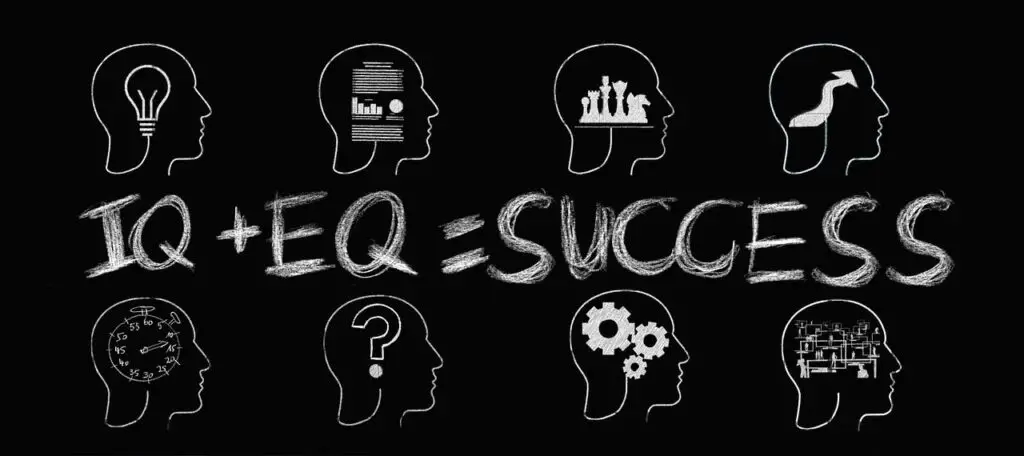This post contains affiliate links.
As the workforce becomes increasingly automated and artificial intelligence handles more technical and routine tasks, the most valuable and distinctly “human” capabilities are taking center stage. Chief among them is emotional intelligence (EQ) – the ability to monitor one’s own and others’ emotions, to discriminate among them, and to use this emotional data to guide thinking and behavior.
While cognitive intelligence (IQ) remains important, decades of research shows that emotional intelligence is the critical factor that sets star performers apart. People with high EQ are more adept at navigating workplace dynamics, communicating effectively, making sound decisions, and cultivating strong relationships – skills that can’t be replicated by machines.
In this comprehensive guide, we’ll explore why emotional intelligence is so vital, dig into the core competencies, and provide a roadmap for purposefully developing your EQ to gain an unfair professional advantage.
Mastering emotional intelligence for workplace success requires: 1) Deeply understanding EQ’s impact on performance, collaboration and leadership; 2) Committing to ongoing self-evaluation and strengthening self-awareness; 3) Studying proven EQ frameworks like self-management, social awareness and relationship skills; 4) Deliberate practice applying EQ in real workplace scenarios; 5) Embracing challenges that pressure-test emotional mastery; 6) Coaching others on EQ as a mastery consolidation. With diligence across this iterative cycle of learning and application, professionals can elevate their “human skills” to thrive amid AI-driven workforce shifts that make EQ increasingly vital.

The Case for Emotional Intelligence at Work
Before we define EQ in-depth, let’s look at some of the powerful impacts it has in organizational contexts:
- Better Job Performance
Employees with high EQ are more productive, create better teamwork experiences, have higher-quality work relationships, negotiate more effectively, and display more leadership potential. One study found that 90% of top performers scored high in EQ capabilities. - Effective Leadership
EQ allows leaders to inspire and motivate rather than simply dictate. They’re more adept at reading situations, influential communication, conflict resolution, change management, and driving organizational engagement/performance. - Improved Decision Making
Being aware of how emotions shape perception helps EQ individuals make more rational, intentional decisions rather than being hijacked by bias, impulse or pressure. - Enhanced Collaboration
High EQ individuals foster more trust, psychological safety and communication within teams. This unlocks more innovation, idea flow and productive disagreement. - Customer-Centric Focus
Employees skilled in empathy can better understand customer needs, provide thoughtful service experiences and build lasting, profitable relationships. - Personal Well-Being
EQ skills like self-awareness, self-regulation and social skills lead to lower stress, more life satisfaction, and stronger support systems.
Clearly, emotional intelligence skills play a pivotal role in optimizing human performance and output across professional contexts. Those who invest in developing this capability gain significant strategic advantages.
Understanding Emotional Intelligence in the Workplace
Emotional intelligence (EQ), also known as emotional quotient, refers to a person’s ability to recognize, understand, and manage emotions—both their own and those of others. It plays a crucial role in interpersonal communication, decision-making, problem-solving, and overall effectiveness in the business world.
Here are the key components of emotional intelligence:
- Self-awareness: Recognizing and understanding your own emotions without being overly influenced by them.
- Self-regulation: Adapting your behavior to different situations and effectively managing your emotions.
- Motivation: Internal drive that propels you toward your goals.
- Empathy: Sensitivity to the feelings and emotions of others.
- Social skills: The ability to navigate social interactions effectively.
Why Is Emotional Intelligence Important for Workplace Success?
- Predictor of Success: Research shows that EQ is a critical predictor of success in life. People with high emotional intelligence tend to outperform their peers with high IQs. In fact, a 40-year study by the University of California at Berkeley found that EI was 400% more powerful than IQ in predicting success in various fields.
- Workplace Benefits:
- Higher Earnings: Individuals with high EQ earn an average of $29,000 more annually than those with low EQ. Each percentage-point increase in EQ adds $1300 to an individual’s annual salary.
- Job Satisfaction: High EQ correlates with job satisfaction and overall well-being.
- Interpersonal Functioning: EQ influences how well employees interact with colleagues, manage stress, and handle conflict.
- Leadership Abilities: Successful leaders exhibit emotional intelligence, not just intellectual prowess.
Learn practical strategies for enhancing your emotional intelligence with Emotional Intelligence 2.0, this book [ncludes a self-assessment and actionable steps to improve your EQ.
The EQ Model and Competencies
So what exactly is emotional intelligence composed of? The most robust model breaks it down into two overarching categories with four sub-domains:
Self-Awareness
- Emotional self-awareness: Reading your bodily feelings and emotional tendencies, as well as their impacts
- Accurate self-assessment: Understanding your strengths, weaknesses, values and drivers clearly
Self-Management
- Emotional self-control: Monitoring and regulating your impulses, moods and reactions effectively
- Motivation: Using your deepest emotional preferences to move and guide yourself toward your goals and outcomes
Social Awareness
- Empathy: Sensing others’ emotions, resonating with their perspectives and cultivating rapport
- Organizational awareness: Reading emotional currents and power dynamics within groups
Social Skills
- Influential communication: Sending clear, convincing and impactful messages
- Building bonds: Nurturing productive relationships, managing conflict and finding common ground
- Leadership: Inspiring others, catalyzing change and developing talent
Each sub-domain represents capabilities that, when developed holistically through intentional practice, propel individual and organizational success.
Explore the impact of emotional intelligence on personal and professional success. Learn how to develop your EQ skills and apply them in various aspects of your life with The EQ Edge: Emotional Intelligence and Your Success, buy now on Amazon.
The Emotional Intelligence Development Process
Unlike IQ which is predominantly innate and fixed by adulthood, emotional intelligence is considered a highly flexible capability that can be improved over time through effort and dedication. Here is a proven process for systematically strengthening your EQ:
1. Self-Evaluation and Feedback
Start by measuring your current emotional intelligence through self-assessments, 360 tools that gather confidential feedback from others, and introspection exercises. Identify EQ strengths to leverage and opportunities for growth.
2. Build Foundational Self-Awareness
Focus initially on enhancing your self-awareness through mindfulness, stress management, journaling, and techniques like meditation to stay connected to your internal emotional state. This self-awareness forms the basis for stronger self-management and social skills.
3. Learn EQ Models and Applications
Study the psychological models behind emotional intelligence as well as how they apply specifically to workplace contexts. Books, online courses and in-person training programs provide frameworks for purposefully building capabilities.
4. Seek Real-World Practice
Like most skills, emotional intelligence requires experiential practice. Identify areas like workplace interactions, projects, or personal situations that allow you to repeatedly apply your self-management, social awareness and relationship skills in low-risk scenarios. Track your growth through reflection and feedback.
5. Take the Heat
As your EQ develops, add more complexity by purposefully exposing yourself to high-stakes, stressful or adverse situations. These intense moments provide invaluable practice for regulating intense emotions and consciously deploying your capabilities under pressure.
6. Coach and Mentor Others
After mastering self-awareness and self-regulation, turn your focus externally to coaching and developing others’ emotional intelligence. This solidifies your own knowledge and perspective by putting it into action.
Bringing It All Together
Successfully applying emotional intelligence requires harmonizing all the competencies across self-awareness, self-regulation, motivation, empathy and social skills simultaneously.
It also requires incredible self-discipline, commitment to deliberate practice, and openness to continual growth. Those able to master emotional intelligence separate themselves from the pack and become uniquely impactful leaders, teammates and organizational architects.
But the investment of persevering through the challenges of EQ development yields immense dividends in the form of more effective communication, decision making, teamwork and overall personal/leadership success.

The Criticality of EQ in an AI-Powered World
While AI and machine learning are rapidly proliferating, automating many tasks and job functions, human emotional intelligence remains an enduring bastion that technology cannot easily replicate. EQ capabilities are unique to human brains and deeply embedded in our lived experiences, relationships and culture.
As automation absorbs more standardized and programmable work activities, the biggest opportunities will emerge around creativity, critical thinking, social interaction and emotional labor. This is the unique domain where humans can still outperform machines.
Moreover, as our interactions with technology become more ubiquitous, a high degree of EQ is required to mitigate ethical risks and ensure human values like empathy, trust and emotional wellness are preserved in human-AI collaboration models.
Thus developing exceptional emotional intelligence will be one of the core differentiating capabilities for thriving professionals in the future of work. EQ represents perhaps the last bastion of distinctly human skills that cannot be fully replicated by artificial intelligence.
Applications Across Work Contexts
While vital across all professional domains, emotional intelligence skills are particularly pivotal in certain workplace contexts like:
- Leadership Development: A well-developed EQ is considered a foundational requirement for leadership excellence, as it enables motivation, influence, conflict management, change facilitation and team cohesion.
- Customer Experience (CX) & Service Roles: Emotional awareness and empathy lie at the heart of delivering tailored experiences and lasting customer loyalty.
- Sales and Negotiations: Emotional intelligence leads to higher social/influence capability, reading situations and being more persuasive.
- Human Resources and People Management: From coaching to conflict resolution, talent acquisition to organizational development, EQ reigns supreme.
- Healthcare and Caregiving Professions: The ability to empathize and connect emotionally is vital when dealing with physical and emotional vulnerability.
- Change Management and Organizational Transformation: EQ enables leaders to navigate the human factors during periods of turbulence and transition.
By prioritizing and systematically improving emotional intelligence, you become better equipped to thrive in these realms where social skills, teamwork and motivation are paramount.
Cultivating EQ Across the Organization
While individuals can independently develop emotional intelligence, companies are increasingly recognizing it as an essential organizational capability. Organizations with higher collective EQ levels reap benefits like:
- Stronger employee engagement, fulfillment and retention
- More cohesive teams with higher trust and psychological safety
- Improved customer loyalty and brand reputation
- Superior leadership pipeline and succession strength
- Higher ethics, values resonance and social responsibility
- Greater resilience and adaptability in the face of disruption
Fostering organizational EQ involves embedding emotional intelligence into talent management practices like assessments, training programs, leadership development, coaching and recognition/incentives. It also necessitates cultivating cultural norms that value empathy, self-awareness and emotional skills as true differentiators of individual and company performance.
Collectively, these investments allow companies to build distinctive emotional intelligence advantages that are difficult for competitors to replicate.
Effective communication is a key aspect of emotional intelligence. Crucial Conversations: Tools for Talking When Stakes Are High provides practical techniques for handling difficult conversations in the workplace.
The Path of Perpetual EQ Mastery
The road to emotional intelligence mastery is a perpetual one – it’s a capability that requires continuous self-awareness, growth and practice across infinite interpersonal situations. It’s also a journey of authentically embracing both the light and dark aspects of human nature within yourself and others.
But those willing to do the deep inner work around emotional intelligence transformation unlock profound personal and professional rewards. They become empowered catalysts for bringing more consciousness, humanity and heart to organizations and society.
In an AI-driven future, emotional intelligence represents the last bastion of distinctly human skills that drive outstanding workplace performance, impact and organizational sustainability. By prioritizing and systematically improving this oft-neglected capability, you’ll access profound growth opportunities and competitive advantages that create permanent separation from the pack.

